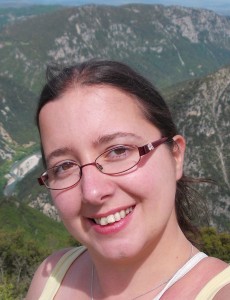 Sarah Jose is third-year postgraduate researcher in plant science. Her research focuses on how plants limit water loss by producing a waterproof coating and pores that can close to prevent water from leaving the leaf. She spends a lot of time looking down the microscope at nail varnish impressions of leaves!
Sarah Jose is third-year postgraduate researcher in plant science. Her research focuses on how plants limit water loss by producing a waterproof coating and pores that can close to prevent water from leaving the leaf. She spends a lot of time looking down the microscope at nail varnish impressions of leaves!
It’s the start of a new academic year. Watching the new batch of postgraduate students settle into PhD life has got me thinking about my own arrival two years ago.
It’s very strange to go from being taught everything as an undergraduate student to being a PhD candidate who has to teach themselves about their project. It was a little overwhelming at first, but with the help of my supervisor and lab mates I quickly learned the skills that would be vital over the coming years, from laboratory techniques to the best ways to organise your data.
It’s exciting being at the helm of research, exploring something that no one has ever done before. You start to feel like a real scientist, and you’re treated like one by academics and students alike. You start talking to people about your ideas and planning your first publication…
But then the niggling voice in the back of your head points out that you’re not a real academic. The ID card hanging from that official-looking University of Bristol lanyard still says “STUDENT”.
Who am I?
Doing a PhD is like living in a student-employee limbo. Life as an undergraduate is very guided and enclosed, although it might not feel like it at the time. You go to lectures and practical lab classes, you have exams, and then you finish. Postgraduate research is far less structured; you are the driving force behind your project, so it takes a certain type of control freak / self-motivated person to get anything done.
I’ve had access to loads of great training and resources as a student at the University (and of course there are the added benefits of student discounts and council tax exemption). At the same time, I am lucky enough to be paid a living allowance stipend, which instils a sort of employee mentality. I always work in the office instead of at home, which has enabled me a deeper integration within my department because you get to know the people you work with.
As a postgrad you and your peers have a lot more experience than you had as an undergraduate, where every lab technique was new. As a third year, I’m pretty confident with the methods I use, but speaking to post-docs makes me realise that they have a far wider range of experience and skills than I do! Building up this knowledge takes time and it’s usually not something you’d sit down and study, but rather you’d ask someone to show you how.
A research apprentice
I tend to see myself as an apprentice researcher. Doing a PhD is all about acquiring the skills you will need later and learning the academic ropes. You do have annual assessments and hopefully you get a degree at the end of it, but you’re the one in control.
My advice to our new starters? Make the most of your status. Take advantage of the constant barrage of opportunities to learn new skills as a student, but use your professionalism to show that you are a researcher in your own right. Attend conferences, talk to other people, and don’t be put off by their titles. You’re not an undergrad anymore; you’re a researcher.






